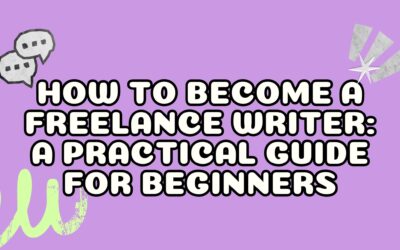The word freelance writer has been a buzzword for quite some time now — but what does it actually mean?!
According to Askwonder, freelance writing is the third most popular freelancing task, representing 17% of all freelancing in the UK and US.
You’re not alone if you’ve been scouring the internet to find out what exactly a freelance writer does and, just as importantly, what a freelance writing career involves.
There has been a surge in the number of freelance writing gigs and those choosing to take up a freelance writing career because of layoffs during the pandemic and the worsening global economy, but it can be difficult for new freelance writers to know exactly what having a freelance writing business means.

A freelance writer can do various types of writing and find clients in multiple ways. In this blog post, we’ll share everything you need to know about being a freelance writer and the types of freelance writing.
What is freelance writing?
Freelance writing involves self-employed individuals writing words for companies or individuals. This could be the words on a website, in an email, for a blog post, or even on a print brochure.
The main thing to note here is that a freelance writer isn’t a full-time employee for a company or organisation, but most people will keep their day job while they build up their freelance writing business. You can get freelance writing jobs with various companies at once on a subcontractor basis.
On the downside, you don’t get any benefits such as health insurance, sick leave, or holiday pay when you have your own freelance writing business
There are a few different ways a new freelance writer can operate their freelance writing career.
They can take on an individual writing assignment from companies, like the full copy for a website or a brochure, whitepaper, or ebook (a.k.a. things that only need to be written once).
Alternatively, they can work on what’s known as a “retainer basis” where they write several pieces of copy a month for companies. This is particularly common for freelance writing work in digital marketing, like press releases, blog posts, and email campaigns.
Finally, a self employed writer can also work on a contract basis with companies where they are hired by a company for a set period of time and can only work with that company during the specified time.
Heads up: there are two types of freelance writers — freelance ghostwriters and named freelance writers. Freelance ghostwriters write words that are published in the name of somebody else, whether it’s a company or another individual, whereas named freelance writers have a byline on their work.
Do you need a degree to be a freelance writer?
Short answer, no! You don’t need a creative writing or journalism degree to pursue a freelance writing career. Various successful freelance writers are leaving their mark without any academic writing background.
(That said, it can help to have qualifications or past experience if you’re working in a writing niche like medical writing, technical writing, or grant writing and it can give you extra oomph for your own blog too.).
Freelance writers might not need a degree, but they do need a few writing samples to showcase their work. Here are a few ways freelance writers can create samples to get a few clients:
- Guest posting on publications
- Posting content on your own blog
- Leveraging platforms like Medium, BlogSpot, etc.
However, to be a successful freelance writer, you will need to educate yourself on how you can deliver quality work and on some basic freelance writing skills such as:
- Researching
- Keyword research
- Search engine optimisation
- Communicating effectively with clients
- Invoicing
Professional writers are able to master not just the writing part of freelance gigs, but also everything around it, like managing a business, optimising their time management, and carrying out research. You can be the best writer in the world, but if you don’t understand the business side of freelance work, it’s difficult to be a successful professional writer.
What does a freelance writer do?
Freelance writers offer writing services to companies in exchange for payment. Successful writers tend to have a handful of different clients at the same time to give them a workload they’re comfortable with.
It’s unlikely a freelance writer will be writing 24/7, nobody can manage that! But they will spend a large chunk of their time writing. It depends on how many potential clients you have too. Some freelance writers choose to have just one client that they work for around their day job, while others have several writing jobs on the go at once to make up a full-time income.
The life of a freelance writer seems like a dream to many.
Yes, you get to set your working hours, decide your writing services, and work with multiple clients, from anywhere, without a boss to pester or micromanage you. But there is a lot of work behind that glam.
The day-to-day role of a freelance writer depends on the content you’re writing. But here’s a general list of what a freelance writer does apart from writing content:
- Networking
- Spending time creating a personal brand on social media
- Getting on a call with clients
- Invoicing
- Pitching to new clients
And, of course, writing.
If freelancing is your full time career, you’ll also be scouring job boards regularly to find new work, taking a free course or two to upskill, and reaching out to prospective clients to get more writing experience in the niches you want to break into and find ongoing work. It also helps to network with other writers to learn from others and put yourself in a good position for referrals.
Who hires freelance writers?
Clients hire a freelance writer, and it can be any business. Businesses need content to create awareness among new customers and communicate with them.
It can be start-ups, small businesses, or big, household name brands and enterprises. You can have multiple freelance clients and work with them simultaneously.
Small businesses hire freelance writers because they don’t have the time and resources to hire in-house writers or write the content themselves. They hire writers to keep up with the backlog — they look for a good writer to keep up with the backlog and focus on churning out words while they come up with the strategy.
For them, freelance writers are the best solution as they get top-notch content without committing to hiring a full-time employee.
On the other hand, enterprises and big-name businesses hire freelance writers to scale their content production. It’s cost-effective for them as they don’t have to hire numerous experienced writers on payroll. They can still hire the writing skills they need by hiring people for multiple freelance writing gigs at one time.
However, they will often have in-house content strategists and editors to polish the first draft freelance writers send them.
6 common types of freelance writing
As a new writer who’s ready to start freelance writing, you can either pick one writing niche and master it over time or be a generalist and decide later.
There’s no hard and fast rule for this—you can take the time to discover your writing capabilities over time. Here are the five most popular types of freelance writing:
1. Freelance blog writers
This is the most well-known example of freelance writing. Most people refer to blog post writers as content writers. Clients usually give provide a blog topic, and the freelancer is expected to hand over a finished draft.

Blog lengths usually range from 500 words to 4000 words.
But most of the time (hopefully!), your client will notify you about the estimated word count for each piece. Consistency is the most significant advantage of being a blog writer because brands need regular content to post on their blog.
2. Freelance copywriters
Freelance copywriters focus on writing copy for a client, like advertising copy and website copy. Copywriting is drastically different from content writing because its main aim is to sell products or services (whereas content is about educating and entertaining a target audience).

As a copywriter, you can specialise in any of these:
- Writing social media posts
- Writing web pages
- Writing website copy (e.g. home page, services page, and landing pages)
- Writing sales pages
- Writing ads for search engine optimization and social media posts
- Freelance email copywriters
3. Freelance email copywriters
According to Statista, email marketing revenue is estimated to reach almost 11 billion by the end of 2023. It’s a very profitable channel for companies to use to engage with potential customers and persuade them to invest in their products or services.
This is why email copywriters are in high demand. As an email copywriter, your day-to-day can look something like this:
- Drafting a welcome email to warm up new subscribers to the mailing list
- Writing an email sequence for a product launch, upcoming sale, or email campaign.
- Writing nurturing email sequences to nurture new leads from a website or ad.
- Thanking customers for purchasing or signing up.
4. Freelance case study writers
Case studies help businesses tell a story about how they’ve helped their customers reach their goals. A well-written case study backed by correct statistics will help your client gain trust among other ideal audiences.

As a freelance case study writer, your responsibilities can look like this:
- Understanding the client’s audience
- Understanding the critical problem or challenges of the customers
- Forming a narrative around the solution to entice readers
- Adding concrete stats to back up the claims
5. Freelance article writing
An article writer writes magazine articles for any specific publication, event, or news. Here’s what your responsibilities would look like:
- Interviewing sources
- Research news and investigate reports
- Validate statements
- Write the article
- Proofread and edit
6. Freelance editors
You don’t have to write content from scratch every time—you can make a living by editing the existing someone else’s content.

This job involves:
- Polishing client’s first draft
- Proofreading website copies, emails, and onboarding sequences for the product team
These are just a handful of writing jobs a new freelance writer can get stuck into, but it’s by no means an exhaustive list. If it involves words, it can be a potential freelance writing job!
Here are some more types of freelance work that involve writing:
- Grant writing
- Technical writing (e.g. user guides and manuals)
- Social media writing
- Ebook writing
- Print writing (e.g. for brochures, leaflets, posters, and real-life ads)
- Headline writing
- Scriptwriting
- Writing short stories
- Writing product descriptions
- Writing meta descriptions for search engines
- Writing up webinars, podcasts, and YouTube videos
When you become a freelance writer, consider the types of writing you enjoy and go from there. Very few people who start freelance writing will enjoy every freelance writing job that comes their way, so it’s important to identify freelance jobs that are a good fit.
Is freelance writing worth a shot?
If you’re thinking about whether freelance writing is a good career choice or not, then my answer is: yes! You can set your own schedule, choose the different clients you want to work with, and generally have a lot more freedom. But it does take time to become a professional writer with lots of potential clients.
If you want to know how to start freelancing, spend time researching more about the target audience and industry you want to start with. As you spend more time analysing other writers and learn from their lessons, it will be easier for you to gain access to better clientele and create a freelance writing business that you love and allows you to live the life you want.






0 Comments